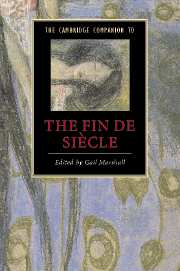Book contents
- Frontmatter
- Introduction
- 1 Psychology at the fin de siècle
- 2 Decadence and aestheticism
- 3 Sexual identity at the fin de siècle
- 4 Socialism and radicalism
- 5 Empire
- 6 Publishing industries and practices
- 7 The visual arts
- 8 The New Woman and feminist fictions
- 9 Realism
- 10 The fantastic fiction of the fin de siècle
- 11 Varieties of performance at the turn of the century
- 12 Poetry
- Guide to further reading
- Index
- Series List
1 - Psychology at the fin de siècle
Published online by Cambridge University Press: 28 September 2008
- Frontmatter
- Introduction
- 1 Psychology at the fin de siècle
- 2 Decadence and aestheticism
- 3 Sexual identity at the fin de siècle
- 4 Socialism and radicalism
- 5 Empire
- 6 Publishing industries and practices
- 7 The visual arts
- 8 The New Woman and feminist fictions
- 9 Realism
- 10 The fantastic fiction of the fin de siècle
- 11 Varieties of performance at the turn of the century
- 12 Poetry
- Guide to further reading
- Index
- Series List
Summary
Things as they are totter and plunge, because man is weary, and there is no faith that is worth an effort to uphold them. . . Over the earth the shadows creep with deepening gloom, wrapping all objects in a mysterious dimness, in which all certainty is destroyed and any guess seems plausible. . . And thus it appears as if the whole of civilized humanity were converted to the aesthetic of the Dusk of Nations.
(Max Nordau, Degeneration (1895))In 1895 Max Nordau's Degeneration was translated and presented to an English readership. Opening with an attack on wealth and luxury, it seems at first to echo a familiar liberal assault on aristocratic decadence. But Nordau's tone soon changes, and for the most part Degeneration forms a long diatribe against 'the new aesthetic tendencies' in contemporary art, in particular mysticism, Impressionism and Symbolism, encompassing the writings of Tolstoy, Ibsen, Ruskin, Zola, Nietzsche and Baudelaire, the music of Wagner, and the art of Burne-Jones and D. G. Rossetti. In a sweeping overview that reproduces the 'hysteria' that he claimed to see all around him, Nordau insists that the work of modern artists displays all the symptoms of morbidmental pathology. It is they who are both causes and symptoms of contemporary decline and who need, like criminals and the insane, to be studied in the light of the developing disciplines of psychology, psychiatry and criminology.
Between January and May in the same year, H. G. Wells's story The Time Machine appeared as a monthly serial in the New Review. It too paints a stark picture of universal decline. But Wells sets the 'dusk of nations' far into the future, and uses the possibilities of both science and fiction to speculate on scenarios beyond the boundaries of the present. The laboratory dissolves as the time machine accelerates into the future, and the process of evolution is imaginatively speeded up.
- Type
- Chapter
- Information
- The Cambridge Companion to the Fin de Siècle , pp. 13 - 30Publisher: Cambridge University PressPrint publication year: 2007
- 5
- Cited by

